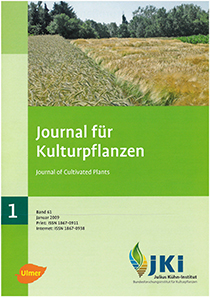Efficacy of plant protection substances against virus transmission by aphids infesting potato
DOI:
https://doi.org/10.5073/JfK.2009.01.04Keywords:
Potato, insecticides, aphid behaviour, Aphis frangulae, Aulacorthum solani, PVY transmissionAbstract
The behaviour of aphids on potato leaf-discs was analysed using time-lapse video-recording. In these experiments the behaviour of both apterous and alate Aphis frangulae and Aulacorthum solani were studied. The number of probes, the time to the onset of probing, the mean duration and the mean total duration of all probes made within a period of 15 minutes were used to characterize the effect of two insecticides (Ripcord 10 and Confidor).
The behaviour of the two aphid species and the two morphs differed. At a low temperature (16°C) most probes were made by apterae of A. solani and the fewest by alate A. frangulae.
After exposure to insecticides the aphids showed species specific responses. While testing the leaf surface the successive probes became shorter in both aphid species. This is typical behaviour for aphids on non host plants.
Ripcord 10 induces a strong reaction in both species, which finally adopt a “pain position”, in apparent attempt to reduce body contact with the treated leaf surface. The application of Ripcord 10 caused a reduction in number of probes and duration of probes made by all the morphs except apterous A. frangulae. The lowest number of probes was made by the aphids exposed to Ripcord 10 at 25°C.
Confidor did not induce the aphids to adopt a “pain position”. However, at 25°C apterous A. solani treated with this insecticide made the fewest probes, whereas the alatae made the fewest probes at 16°C.
The opposite was found for alate A. frangulae, which made the fewest probes at 25°C. Exposure of apterous aphids of this species to Confidor at 25°C resulted in more and more prolonged probes than in the control, indicating such treatment might increase the risk of transmission of non-persistent viruses like PVY.
Published
Issue
Section
License
The content of the journal is licensed under the Creative Commons Attribution 4.0 License. Any user is free to share and adapt (remix, transform, build upon) the content as long as the original publication is attributed (authors, title, year, journal, issue, pages).
The copyright of the published work remains with the authors. The authors grant the Journal of Cultivated Plants, the Julius Kühn-Institut and the OpenAgrar repository the non-exclusive right to distribute and exploit the work.







